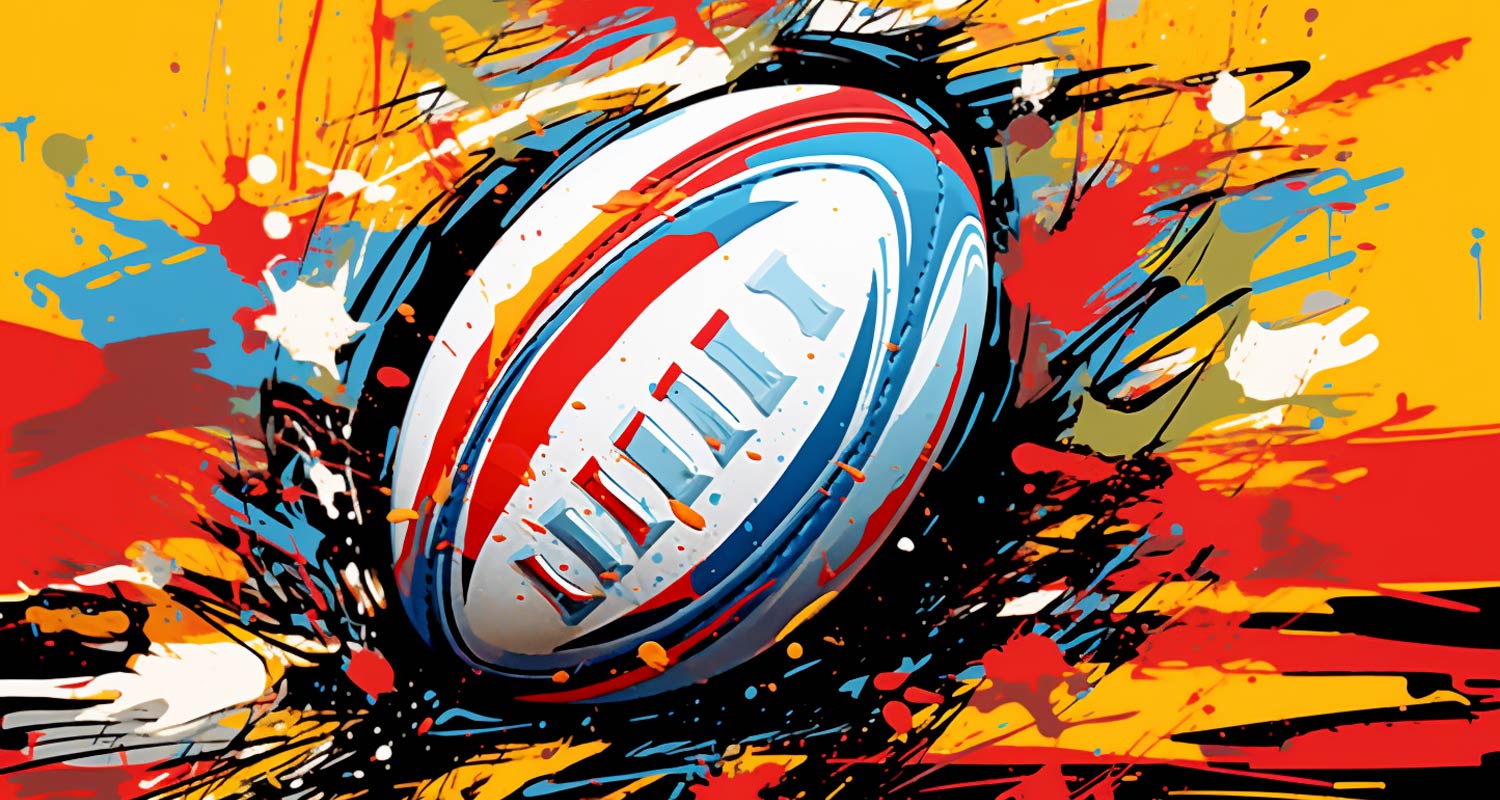 Who will win the 2023 Rugby World Cup? Despite New Zealand’s record loss to South Africa in August, All Blacks fans can take heart from statistical modelling that has them as favourites to win the 2023 Rugby World Cup.
Who will win the 2023 Rugby World Cup? Despite New Zealand’s record loss to South Africa in August, All Blacks fans can take heart from statistical modelling that has them as favourites to win the 2023 Rugby World Cup.
According to Rugby Vision, a well-tested algorithm developed to predict outcomes for major rugby competitions, New Zealand has a 33.5% chance of winning their fourth RWC title. The next most likely champions are South Africa (26.2%), followed by France (20.6%) and Ireland (11.9%).
Evaluation of the model’s predictions at previous World Cups indicate it is well calibrated. And while the system has some similarities with the official world rugby rankings, it is less sensitive to the outcome of any particular game.
The Rugby Vision model uses three key components: a rating system for international teams; estimation of expected outcomes for each World Cup game using those ratings; and 10 000 simulations of the tournament to account for uncertainty around expected outcomes.
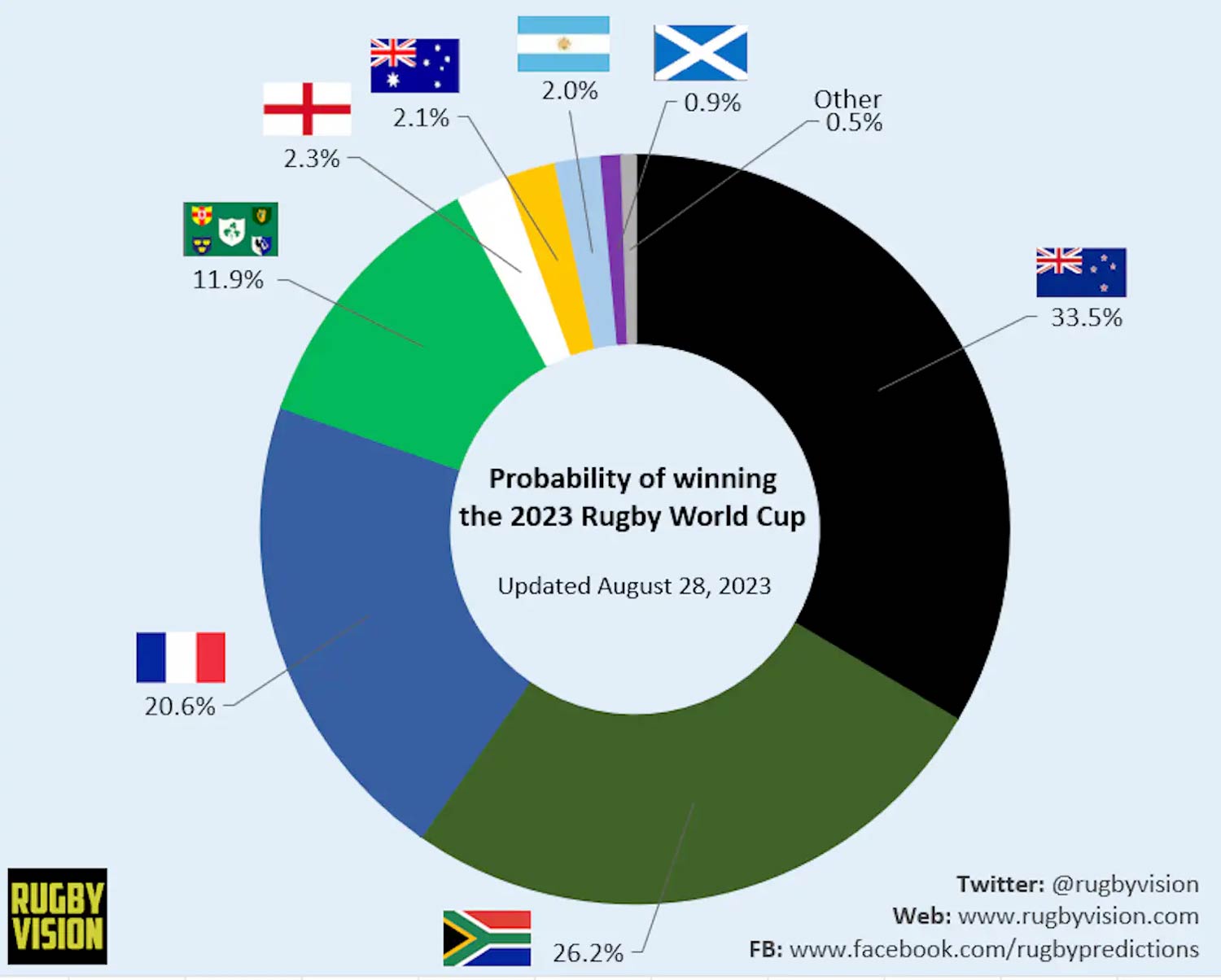 The Rugby Vision rankings are a custom “points exchange” system based on past game results and home advantage (if applicable).
The Rugby Vision rankings are a custom “points exchange” system based on past game results and home advantage (if applicable).
After each of those games, the team that performed better than expected will gain rating points, and the team that performed worse than expected will lose rating points.
These rankings and ratings points for the 20 teams that have qualified for the 2023 World Cup are displayed below. New Zealand is the top ranked team, followed by South Africa, Ireland and France.
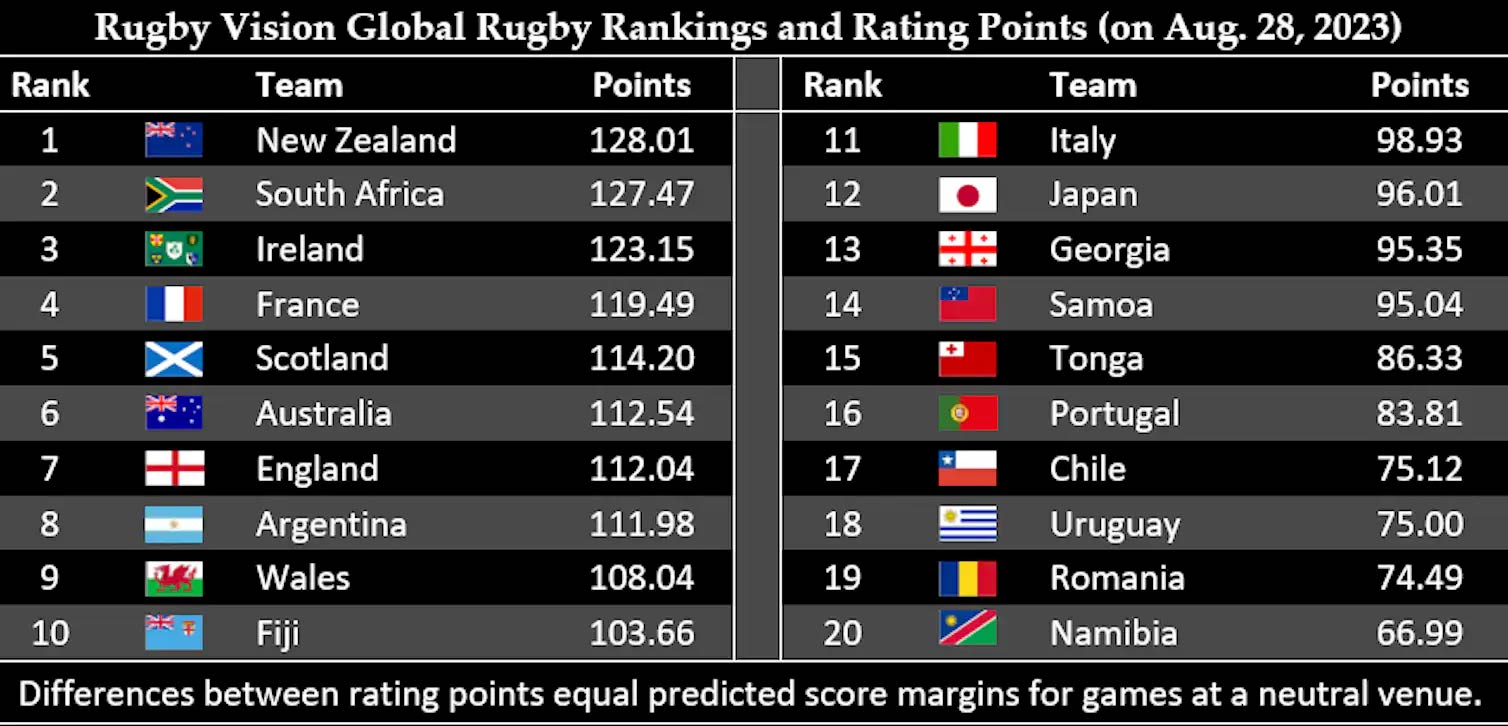 Rugby rankings
Rugby rankings
The same four teams make up the top four in the official rankings, but the seedings are different. Currently, the official world rankings have Ireland at the top, followed in order by South Africa, France and New Zealand.
In the Rugby Vision rankings, differences between rating points for any two teams equal the predicted score margin for a game played at a neutral venue. Home advantage (if applicable) is worth 5.5 points.
This means that in the opening game of this year’s RWC – between France and New Zealand in Paris – New Zealand is expected to win by three points. This is based on the difference in the teams’ rating points (128 minus 119.5) plus 5.5 for the France home advantage.
This estimate means that if the game was played 100 times, New Zealand would win by three points on average. According to the model, in those hypothetical 100 matches, New Zealand would win 57 games, France would win 40, and three games would be drawn.
World Cup teams are initially separated into four pools, with the top two teams in each pool qualifying for the quarterfinals.
In pool games, four competition points are awarded for a win, two points for a draw, and two types of bonus points are offered (one point can be earned for losing by seven or fewer points, and one point is awarded for scoring four or more tries).
Accordingly, the Rugby Vision framework includes a model that estimates the expected number of tries scored by each team in each game.
Who will win?
To account for uncertainty in game outcomes, the system simulates the RWC 10 000 times in accordance with tournament rules. For each of these simulated tournaments, the framework estimates game results and bonus points for each pool game, pool finishing positions, knockout matches, and the winner of each knockout game.
Estimated probabilities of each team reaching various stages of the 2023 World Cup are shown below. These are influenced by team rating points (including home advantage for France), and the draw (which pool each team is in, and rules for allocating teams to knockout games).
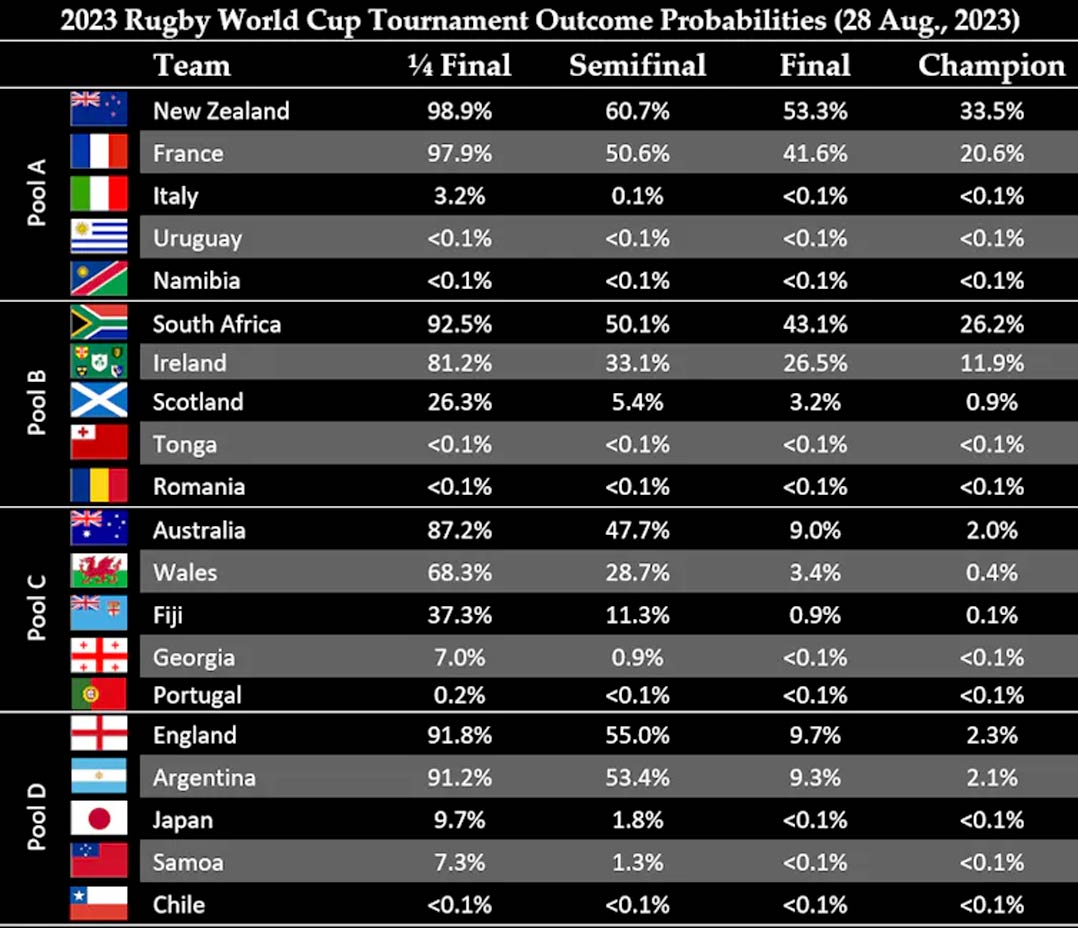 In Pool A, heavyweights New Zealand (98.9%) and France (97.9%) are highly likely to qualify for the quarterfinals. South Africa and Ireland are the likely quarter finalists from Pool B, but there is a 26.3% chance Scotland will send one of those teams home early.
In Pool A, heavyweights New Zealand (98.9%) and France (97.9%) are highly likely to qualify for the quarterfinals. South Africa and Ireland are the likely quarter finalists from Pool B, but there is a 26.3% chance Scotland will send one of those teams home early.
Pool C appears to be the most even group. Australia (87.2%) and Wales (68.3%) are the most likely teams to progress, but Fiji (37.3%) also has a reasonable chance of qualifying for the quarterfinals.
In Pool D, England and Argentina are favourites to make the quarterfinals, with Japan and Samoa possible spoilers.
After the initial round, Pool A teams will play opponents from Pool B in the quarterfinals. Because these are strong pools, semi-finalist probabilities for these teams are relatively low.
For example, Ireland has an 81.2% chance of being a quarterfinalist but only a 33.1% probability of making the semifinals.
Teams in Pools B and C will have easier quarterfinal opponents. Consequently, despite relatively low rankings, England is the second most likely team to make the semifinals.
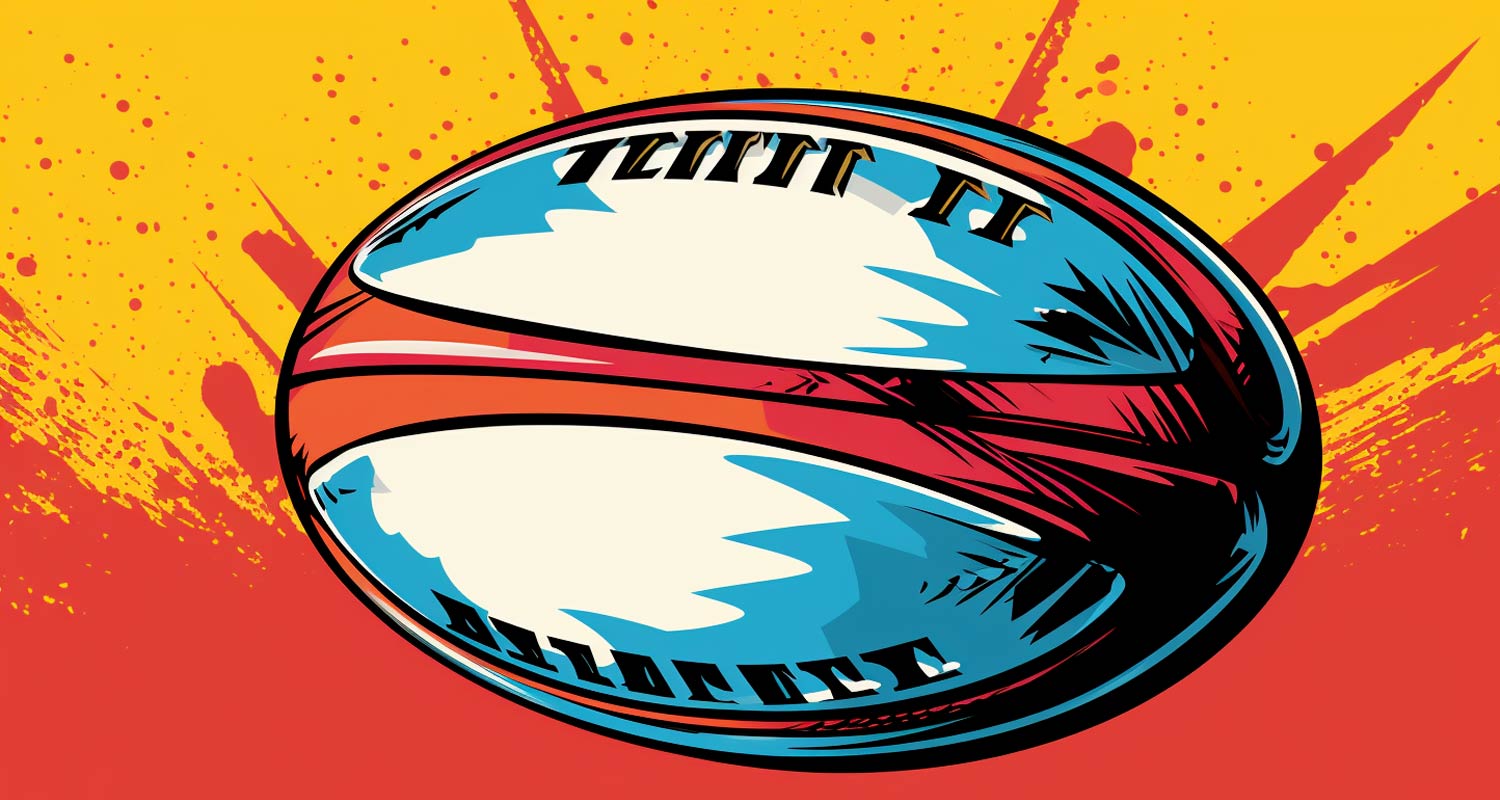 In the semifinals, teams from Pool A and/or B will play teams from Pool C and/or D. As teams from Pools A and B are heavily favoured to win those games, their finalist probabilities are only slightly lower than their semifinalist probabilities.
In the semifinals, teams from Pool A and/or B will play teams from Pool C and/or D. As teams from Pools A and B are heavily favoured to win those games, their finalist probabilities are only slightly lower than their semifinalist probabilities.
Conversely, Pool C and D teams with high semifinalist chances have relatively low finalist probabilities. For example, England has a 55% chance of playing in a semifinal but only a 9.7% chance of being a finalist.
The RWC draw makes it easier for Pool C and D teams to qualify for the semifinals, but these teams are all but guaranteed to play strong semifinal opponents. In short, the draw helps Pool C and D teams go deeper into the tournament, but does not increase their chances of winning.
Finally, while the Rugby Vision predictions provide a reliable forecast, upsets do happen – we just don’t know when. That’s what makes sport so interesting, after all.![]()
- The author, Niven Winchester, is professor of economics, Auckland University of Technology
- This article is republished from The Conversation under a Creative Commons licence

